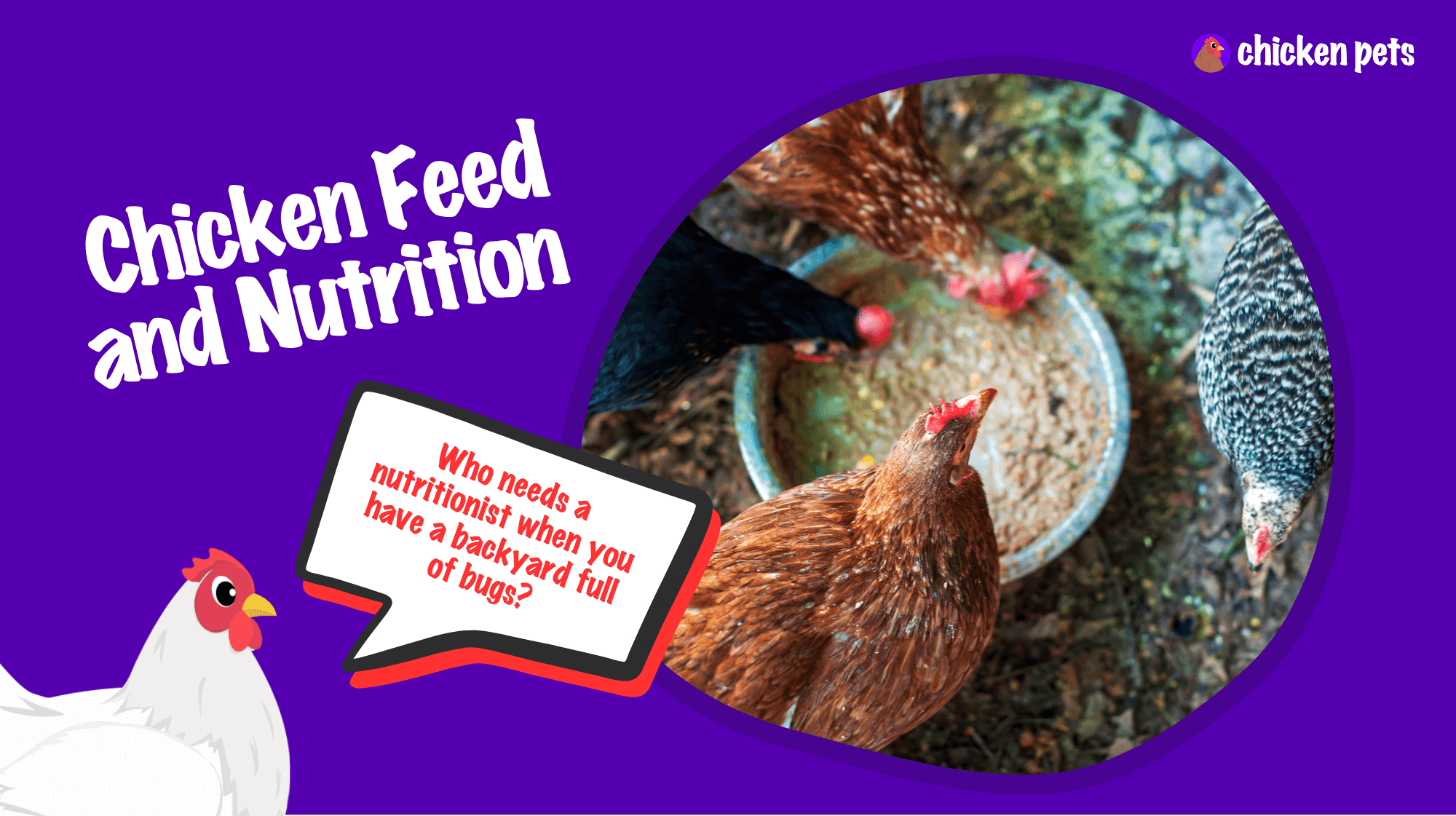Backyard chickens are becoming increasingly popular among homeowners, and for a good reason. They are a great source of entertainment and provide fresh, delicious eggs for your family. However, for your chickens to be happy and healthy, they must have proper nutrition. In this blog post, we’ll discuss everything you need to know about chicken feed and nutrition for your backyard chickens.
What is the ideal diet for a backyard chicken?
An adult laying hen requires a balanced diet typically containing around 16-18% protein, 3-5% fat, and 1% calcium. The feed should also balance carbohydrates, vitamins, and minerals to support overall health. Layer feed, formulated explicitly for egg-laying hens, contains higher calcium levels to help strong eggshells. It’s essential to provide your chickens with the appropriate amount of feed based on age and size to avoid overfeeding, which can lead to obesity and other health issues. Additionally, supplementing their diet with fresh fruits and vegetables can provide additional vitamins and minerals to support overall health.
Essential nutrients for chickens: What to include in their diet.
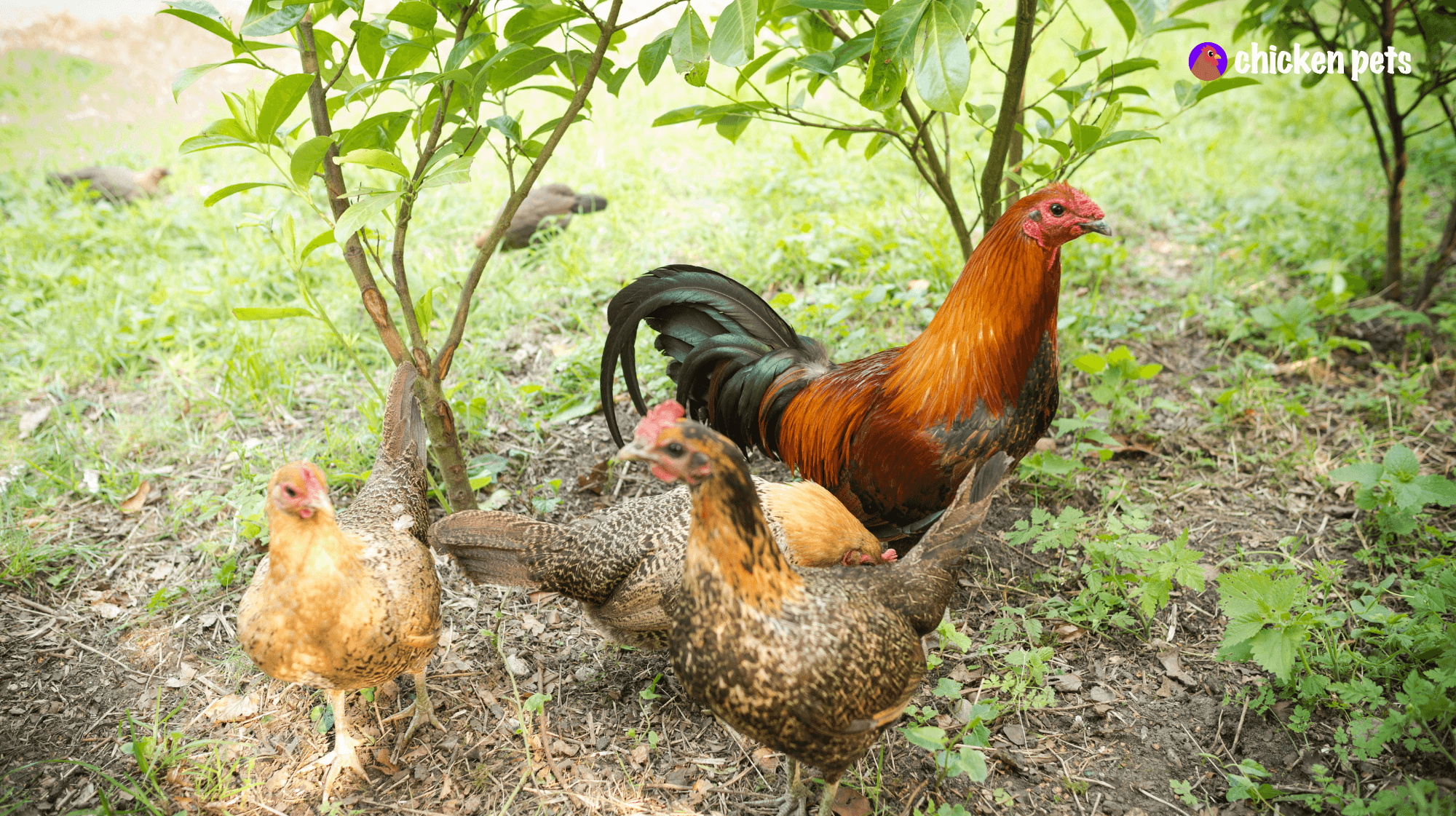
Chickens require a balanced diet that includes a variety of nutrients to keep them healthy and productive. Here are the essential nutrients to include in their diet:
Protein
Protein is essential for growth and development, as well as egg production. Chickens require a high-protein diet, especially during the early stages of life. Good sources of protein for chickens include:
- Chicken feed – Commercial chicken feed typically contains high levels of protein.
- Grains – Grains such as corn, wheat, and barley are good protein sources.
- Insects – Chickens are natural insectivores who enjoy eating insects like mealworms and crickets.
- Meat – Leftover meat or fish can be given to chickens in moderation.
Carbohydrates
Carbohydrates provide energy for chickens and are an essential part of their diet. Good sources of carbohydrates for chickens include:
- Grains – Corn, wheat, barley, and oats are all good sources of carbohydrates.
- Fruits and vegetables – Chickens enjoy fruits and vegetables such as apples, carrots, and leafy greens.
Fats
Fats are an essential energy source for chickens and help keep their feathers healthy and shiny. Good sources of fats for chickens include:
- Chicken feed – Most commercial chicken feeds contain some fat.
- Grains – Grains such as corn and wheat contain small amounts of fat.
- Seeds – Seeds such as sunflower and pumpkin seeds are high in fat.
Vitamins and Minerals
Chickens require a variety of vitamins and minerals to stay healthy. Good sources of vitamins and minerals for chickens include:
- Chicken feed – Most commercial chicken feeds contain vitamins and minerals.
- Fruits and vegetables – Fruits and vegetables such as carrots, spinach, and tomatoes are good sources of vitamins and minerals.
- Oyster shells – Oyster shells are a good source of calcium, which is essential for strong bones and egg production.
In addition to the essential nutrients listed above, it’s vital to ensure that your chickens can always access clean, fresh water. Water is necessary for digestion and helps regulate body temperature.
By providing your chickens with a balanced diet that includes these essential nutrients, you can help ensure they stay healthy and productive.
Choosing the right commercial chicken feed for your flock.
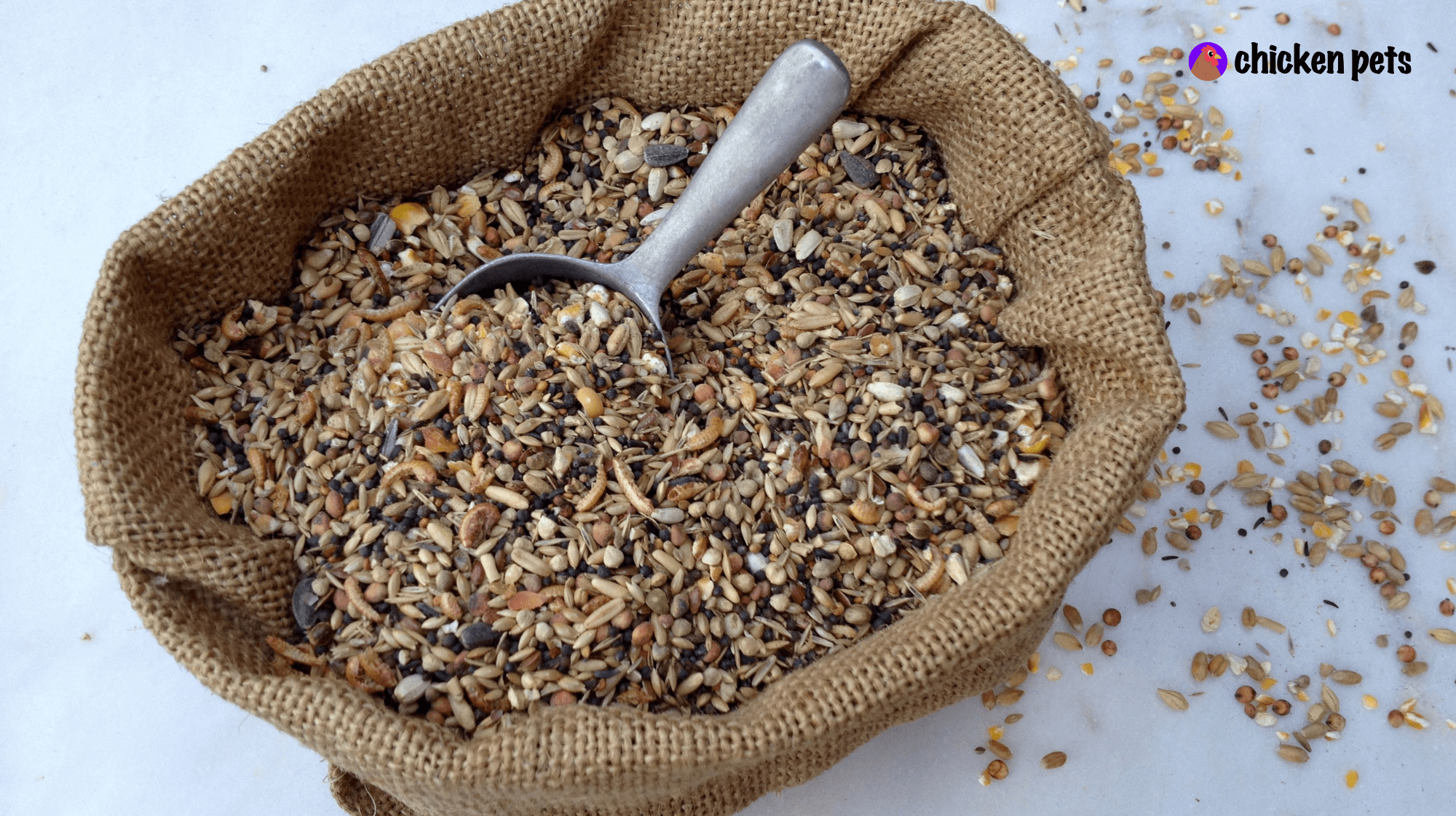
Commercial chicken feed is a convenient and effective way to ensure your chickens receive a balanced diet. Here are some tips for choosing the suitable commercial chicken feed for your flock:
Several types of chicken feed are available, including layer feed, broiler feed, and starter feed. Each type of feed is formulated with specific nutrients and components to meet the needs of different stages of a chicken’s life.
Starter chicken feed.
Starter feed is specially formulated for young chicks, typically up to 8 weeks old. It contains high protein levels of around 20%, which is essential for building strong muscles, bones, and feathers. It also has higher levels of vitamins and minerals to support healthy growth and development. Starter feed is crucial for young chicks, giving them the nutrients for a strong start.
Grower chicken feed.
Grower feed is designed for chickens not yet laying eggs, typically between 8 and 16 weeks old. It contains a balanced ratio of protein, carbohydrates, and minerals, with a protein content of around 16%. This balanced diet promotes healthy growth and development while avoiding excessive weight gain, which can lead to health problems. Grower feed provides essential nutrients for chickens during their growing stage.
Layer chicken feed.
Layer feed is formulated for egg-laying hens at least 16 weeks old. It contains high calcium levels, with a protein content of around 16-18%. The added calcium in layer feed supports the production of strong eggshells. Layer feed may also contain added vitamins and minerals to help overall health and immune function. Providing your hens with layer feed is crucial for maintaining their egg production and overall health.
Broiler chicken feed.
Broiler feed is designed for meat birds and is typically provided from day one until they reach their target weight. It contains higher protein and minerals, with a 20-22% protein content. Broiler feed is formulated to promote rapid growth and efficient feed conversion, and it contains higher levels of minerals, such as calcium and phosphorus, to support bone development and growth. Providing your meat birds with broiler feed is essential for producing meat efficiently and ensuring their health and well-being.
Look for additional supplements.
Some commercial chicken feeds also include additional supplements, such as probiotics and omega-3 fatty acids, to help promote chicken health. Probiotics can help improve digestion and boost the immune system, while omega-3 fatty acids can help promote healthy skin and feathers.
While additional supplements in commercial chicken feed can help promote chicken health, they are not necessarily required for all backyard chicken flocks. Your chickens may not require additional supplements if they are healthy and have a well-balanced diet. However, if you notice digestive issues or skin and feather problems, probiotics and omega-3 fatty acids can be helpful additions to their diet.
Read the label.
Read the label of the commercial chicken feed you choose to ensure it contains the essential nutrients your chickens need. Look for a feed that includes the appropriate levels of protein, carbohydrates, fats, vitamins, and minerals for your chickens’ specific stage of life.
Store the feed properly.
Store the commercial chicken feed in an airtight container in a cool, dry place to stay fresh and nutritious. Exposure to moisture and sunlight can cause the feed to spoil and lose its nutritional value.
Proper storage of commercial chicken feed is crucial to maintain its quality and nutritional value. Here are some tips for storing chicken feed properly:
- Choose a suitable container – Store your chicken feed in an airtight container for storing animal feed. These containers are durable materials designed to keep out moisture and pests. Avoid using plastic bags or containers that may not be airtight.
- Keep it cool and dry – Store the container in a cool, dry place, away from direct sunlight or heat sources. Exposure to heat and moisture can cause the feed to spoil and lose its nutritional value. Make sure the storage area is well-ventilated to prevent the buildup of moisture.
- Rotate old feed – It is essential to use older feed before it goes stale or loses its nutritional value. To prevent waste, purchase only the amount of feed you’ll use within a reasonable timeframe.
- Label and date the container – Label the container with the type of feed and the date it was purchased. This will help you track when the feed was bought and when it should be used.
By following these tips, you can ensure your chickens get the most out of their commercial feed and stay healthy and happy.
Homemade and organic chicken feed.
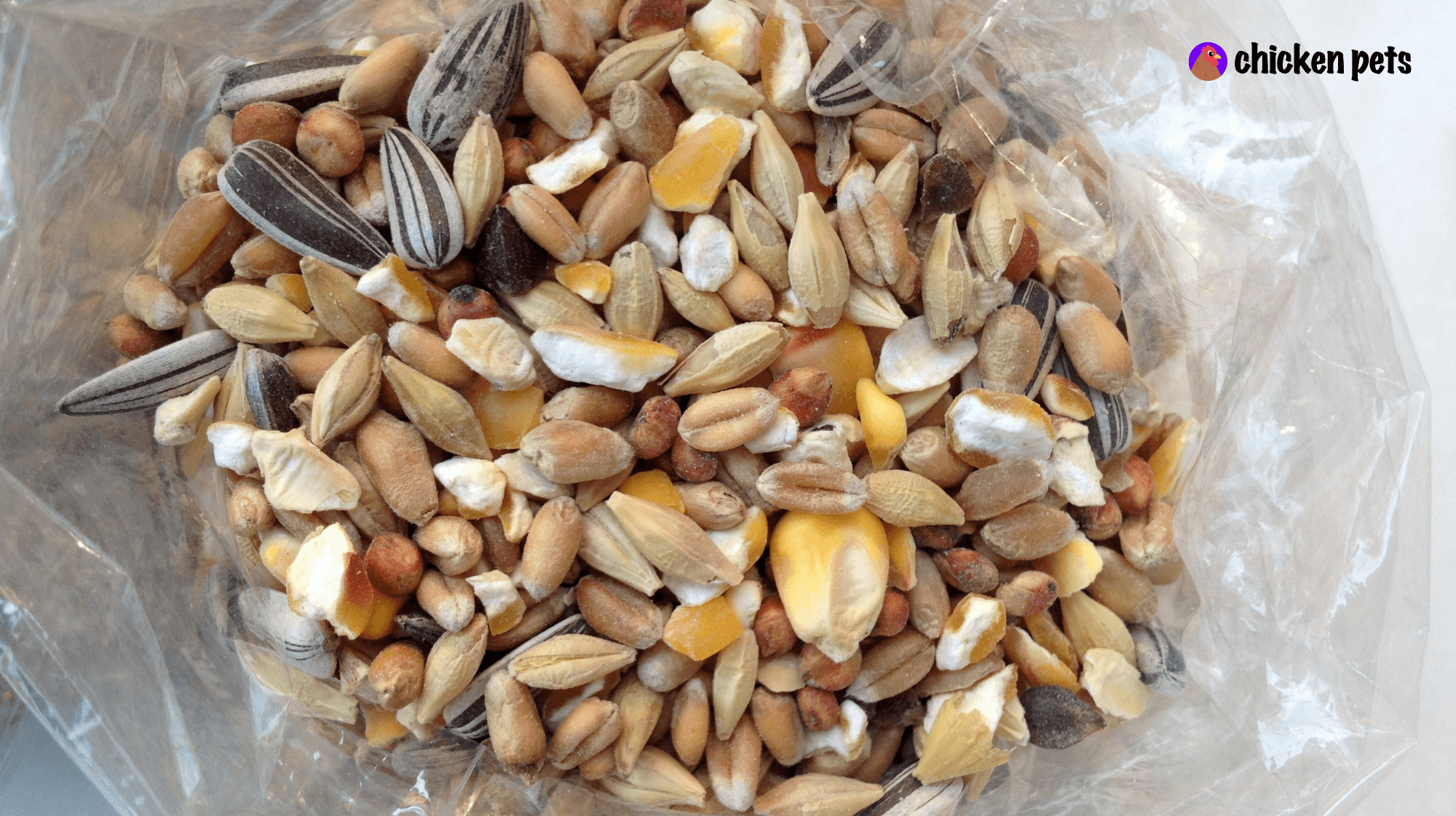
Some backyard chicken owners prefer to make their chicken feed or use organic options. Homemade chicken feed can be a great way to ensure your chickens receive a balanced diet and save money. To make homemade chicken feed, you must include various ingredients such as grains, seeds, and protein sources. Organic chicken feed is also available, made with organic ingredients, and does not contain synthetic chemicals or pesticides.
For backyard chicken owners who prefer to make their chicken feed or use organic options, several things must be considered to ensure your chickens receive a balanced diet.
Homemade chicken feed.
Making your chicken feed can be cost-effective to ensure your chickens receive high-quality, balanced nutrition.
To make homemade chicken feed, you must include various ingredients such as grains, seeds, and protein sources. Some common ingredients used in homemade chicken feed include:
- Grains – corn, wheat, oats, barley, millet, sorghum
- Seeds – sunflower seeds, flaxseed, sesame seeds, hemp seeds
- Protein sources – soybeans, peas, lentils, dried mealworms, fish meal, bone meal
- Calcium sources – oyster shells, eggshells
When creating your chicken feed, it’s essential to maintain the correct ratio of protein, carbohydrates, and other nutrients. Chickens require different ratios of nutrients at various stages of life, so it’s crucial to adjust the feed recipe accordingly.
Here is a basic recipe for homemade chicken feed:
Ingredients:
- 4 parts whole corn
- 4 parts wheat
- 4 parts oats
- 1 part fish meal or soybean meal
- 1 part oyster shells, eggshells
- 1 part salt
Instructions:
- Mix all ingredients thoroughly.
- Store the feed in an airtight container in a cool, dry place.
- Provide the feed to your chickens as needed, adjusting the amount according to their age and stage of development.
Just so you know, this is a basic recipe, and you may need to adjust the amounts and ingredients based on your specific flock’s nutritional needs and dietary restrictions.
Organic chicken feed.
Organic chicken feed is becoming increasingly popular among backyard chicken owners who prioritize high-quality nutrition and want to avoid exposing their chickens to harmful chemicals. This feed is made with organic ingredients, which means it does not contain synthetic chemicals or pesticides.
The term “organic” refers to how crops are grown and processed. Organic farming practices avoid using synthetic fertilizers, pesticides, and genetically modified organisms (GMOs). Organic animal feed also prohibits the use of antibiotics and growth hormones. Organic farming emphasizes the use of natural methods, such as crop rotation and the use of natural predators to control pests. Organic certification ensures the feed meets strict standards and regulations set by the United States Department of Agriculture (USDA).
Commercially produced organic chicken feed can be purchased from many feed stores or online retailers. When choosing organic chicken feed, it’s essential to read the label carefully to ensure that it contains all the necessary nutrients and meets the nutritional requirements of your chickens.
One potential benefit of using organic chicken feed is that it may contain higher levels of certain nutrients, such as omega-3 fatty acids, which can positively impact your chickens’ health. Additionally, organic farming practices prioritize soil health and sustainability, which can lead to more nutritious and environmentally-friendly feed.
It’s important to note that organic chicken feed may be more expensive than traditional commercial feed. However, many backyard chicken owners find that the benefits of using organic feed outweigh the added cost. Suppose you are interested in using organic chicken feed. In that case, it’s a good idea to start by gradually incorporating it into your chickens’ diet and monitoring their health and egg production to ensure they get all the necessary nutrients.
Specialized Chicken Diets.
Specialized diets for chickens can provide additional benefits, but ensuring they still receive a balanced diet with all the necessary nutrients is vital. Vegetarian chicken feed, for example, is made without animal byproducts and may include alternative protein sources such as soybeans. On the other hand, free-range chicken diets allow chickens to forage for their food, including insects and vegetation, which can help supplement their diet with additional nutrients. However, it’s important to note that more than a free-range diets is needed to provide all the necessary nutrients for a chicken’s health.
If you choose to feed your chickens a specialized diet, it’s essential to consult with a poultry nutritionist to ensure that the feed provides all the necessary nutrients for your chickens’ health. You may also need to supplement their diet with additional vitamins and minerals to ensure they receive a balanced diet.
Best practices for feeding backyard chickens: Water, feed, and fresh fruits and vegetables.
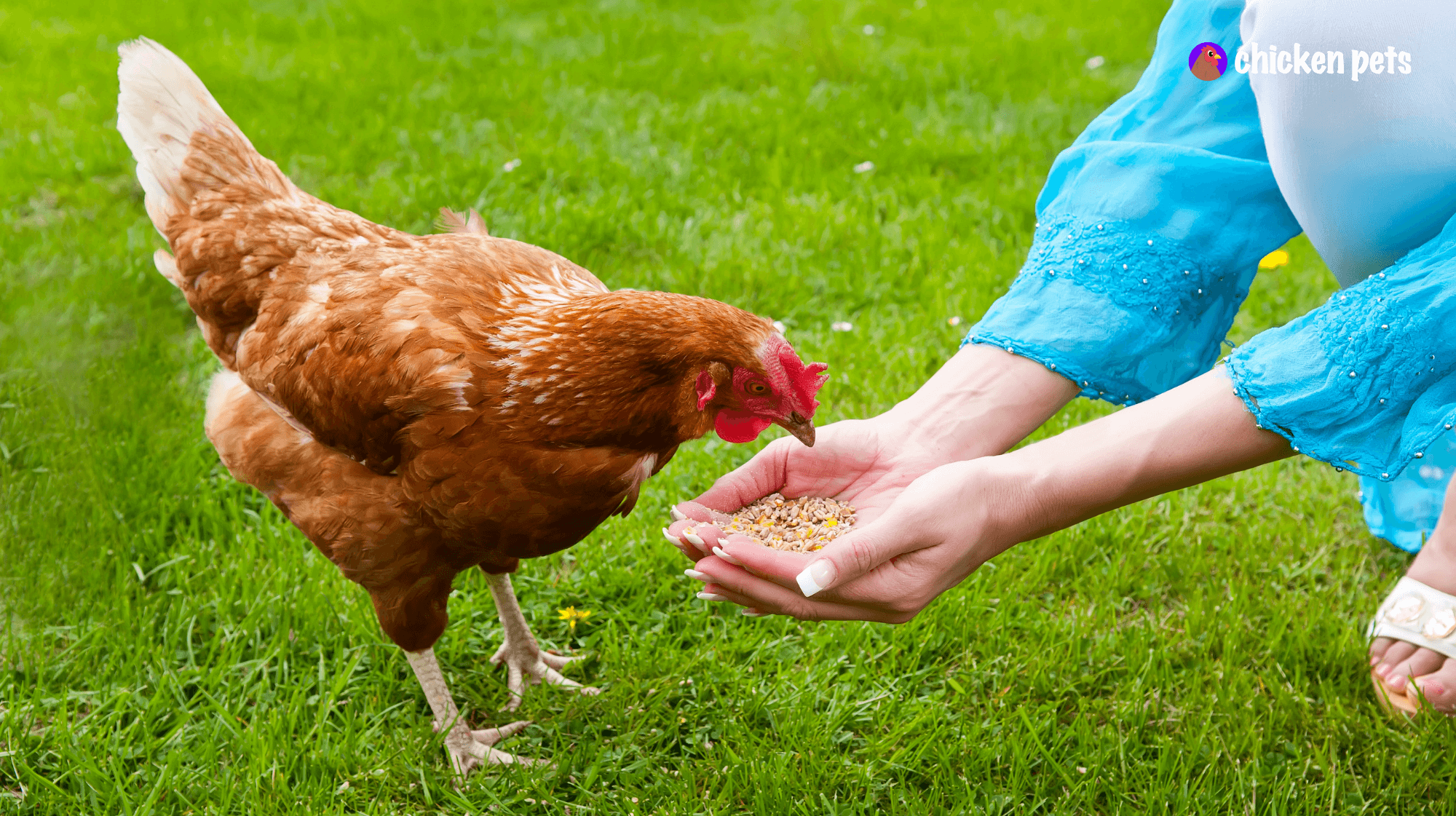
Proper feeding is essential to the health and well-being of backyard chickens. Here are some best practices to ensure that your chickens receive adequate nutrition:
- Provide fresh, clean water – Chickens require plenty of water, especially during hot weather. A lack of water can cause dehydration, decreased egg production, and other health issues. Ensure to provide fresh, clean water daily and check it regularly throughout the day.
- Supplement their diet with fresh fruits and vegetables – While commercial chicken feed provides essential nutrients, supplementing their diet with chicken treats and snacks like fresh fruits and vegetables can provide additional vitamins and minerals. You can feed them various fruits and vegetables, such as watermelon, berries, carrots, and leafy greens. However, avoid feeding them anything harmful to their health, such as avocado, chocolate, or caffeine.
- Avoid feeding chickens moldy or spoiled food – Moldy or spoiled food can harm chickens’ health and even be fatal. Properly store your feed and avoid feeding them anything that has mold or has gone bad.
- Ensure feeders and drinkers are clean – Dirty feeders and drinkers can harbor bacteria and other harmful microorganisms that can make your chickens sick. Make sure to regularly clean and sanitize feeders and drinkers to prevent the spread of disease.
Chicken feed and nutrition FAQ.
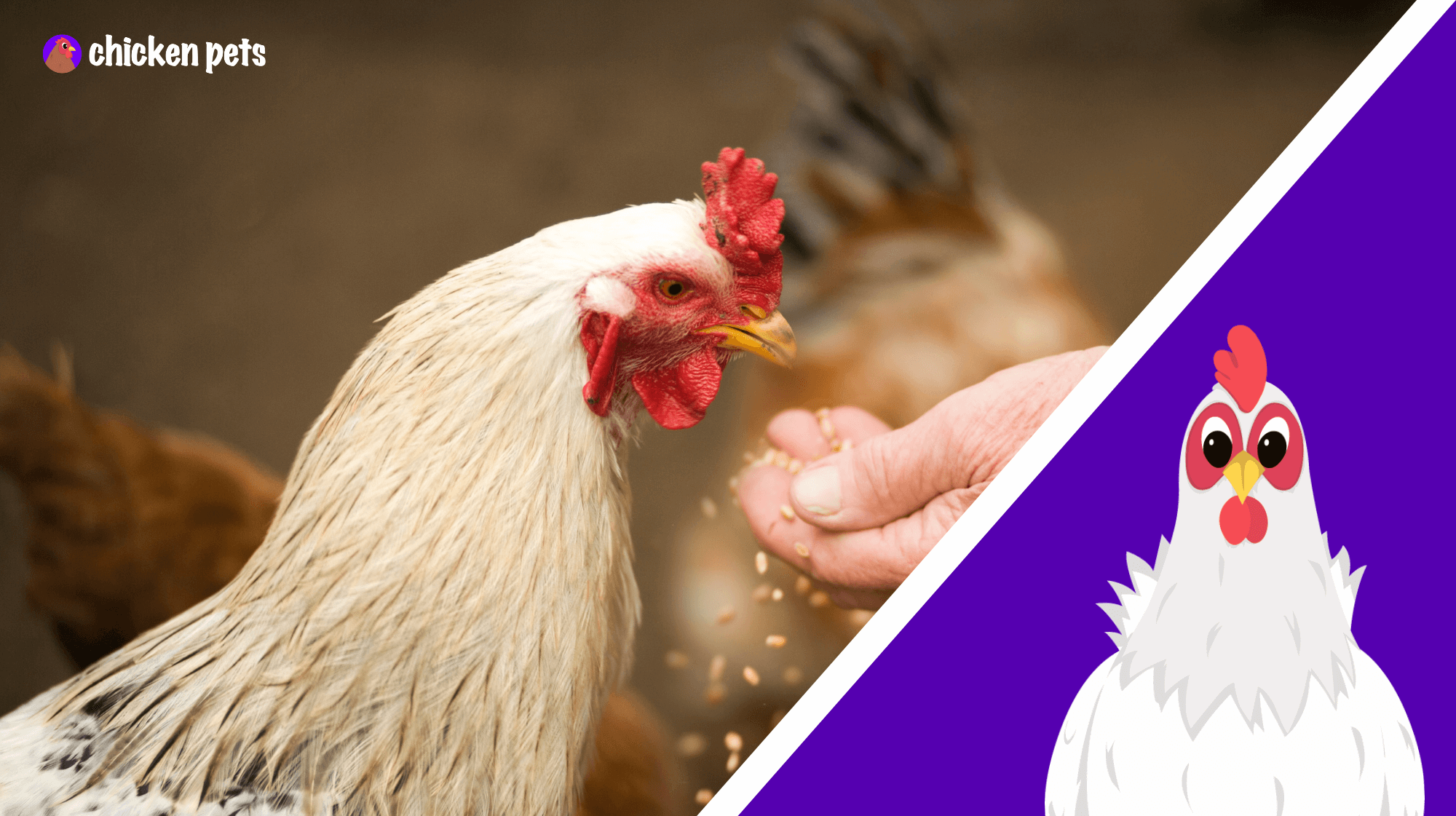
If you’re a backyard chicken owner, you may have many questions about the best nutrition and feeding practices for your feathered friends. In this Chicken Feed and Nutrition FAQ section, we’ve compiled some of the most frequently asked questions about chicken feed and nutrition. We’ve got you covered from what to feed your chickens for the most nutritious eggs to whether chickens need salt blocks. Learn more about providing your backyard chickens with a healthy and balanced diet.
What is the best diet for backyard chickens?
The best diet for backyard chickens depends on their age and purpose. A high-protein starter feed is recommended for young chicks to promote growth and development. As they mature, they can transition to a grower feed with a balanced ratio of protein, carbohydrates, and minerals. For egg-laying hens, a layer feed with added calcium is necessary for strong eggshells. However, it’s important to supplement their diet with fresh fruits and vegetables to provide additional vitamins and minerals. Specialized diets, such as vegetarian or free-range, are also an option but ensuring they still receive a balanced diet is crucial.
What is the healthiest food for chickens?
Commercial chicken feed specifically formulated for their age and purpose is the healthiest food for chickens. It contains the essential nutrients and vitamins to stay healthy and promote growth. Supplementing their diet with fresh fruits and vegetables can provide additional vitamins and minerals. Additionally, providing access to insects and other protein sources can be beneficial.
Do backyard chickens need supplements?
Backyard chickens may benefit from supplements such as probiotics and omega-3 fatty acids, which can improve digestion and promote healthy skin and feathers. However, a balanced commercial feed formulated for their age and purpose should provide all the necessary nutrients.
How do I keep my backyard chickens healthy?
To keep backyard chickens healthy, providing them with a balanced diet, fresh water, and a clean and safe living environment is essential. Regular health checks and preventative measures like vaccinations and parasite control can also help prevent illness and disease. Additionally, providing opportunities for exercise and foraging can promote mental and physical well-being.
What foods are toxic to chickens?
Foods that are toxic to chickens include avocado, chocolate, caffeine, raw or dried beans, green potatoes, and rhubarb leaves. Additionally, moldy or spoiled food can cause illness or death.
What do chicken farmers feed their chickens?
Chicken farmers typically feed their chickens a commercial feed formulated for their age and purpose. They may also supplement their diet with fresh fruits and vegetables and access to insects and other protein sources.
What is the best source of protein for chickens?
The best source of protein for chickens is commercial feed that contains high-quality protein sources such as soybean meal, fish meal, or animal byproducts. Access to insects and other sources of protein can also be beneficial.
Should chickens have food at all times?
Chickens do not need to have food available at all times, as overfeeding can lead to obesity and other health issues. However, access to fresh water should be available at all times.
What happens if chickens get too much protein?
If chickens get too much protein, it can lead to health issues such as gout or kidney damage. It can also cause excessive weight gain and decreased egg production.
What do chickens need daily?
Chickens need access to fresh water, a balanced diet, and a clean and safe living environment daily. Additionally, regular exercise and mental stimulation can promote well-being.
Should you feed chickens cracked corn?
Cracked corn can be a part of a chicken’s diet, but it should not be the only source of nutrition. It is high in carbohydrates and low in protein and other essential nutrients, so it should be used as a supplement to a balanced diet.
How do I give my chickens more nutrients?
You can give your chickens more nutrients by supplementing their diet with fresh fruits and vegetables, insects, or protein-rich sources such as mealworms. Additionally, providing access to a clean, safe living environment and regular preventative health care can promote overall health and well-being.
What vegetables can chickens not eat?
While chickens can eat many vegetables, a few should be avoided. These include raw potato skins, avocado pits and skins, rhubarb leaves, and anything moldy or spoiled. These foods can contain toxins harmful to chickens and cause digestive issues, illness, or even death. It’s important to always research any new food before feeding it to your chickens and only give them food in moderation.
What to feed chickens when there is no grass?
If your backyard chickens don’t have access to grass, there are still plenty of nutritious foods you can feed them. Some good options include fruits and vegetables like spinach, kale, and berries. You can also give them cooked grains, such as oatmeal or quinoa, and protein sources, such as mealworms or crickets. It’s important to ensure that your chickens still receive a balanced diet and access to fresh water.
How to make homemade chicken feed?
Homemade chicken feed can be a great way to ensure that your chickens receive a balanced diet while saving money. To make homemade chicken feed, you’ll need a variety of ingredients including grains, seeds, and protein sources such as soybean meal or fish meal. It’s important to research the necessary ingredients and their percentages to ensure your chickens receive all the essential nutrients they need.
What to feed chickens for most nutritious eggs?
To ensure that your chickens lay nutritious eggs, providing them with a balanced diet that includes plenty of protein, vitamins, and minerals is essential. Good options include commercial layer feed, explicitly formulated for egg-laying hens, and includes high levels of calcium and other nutrients essential for egg production. Additionally, supplementing their diet with fresh fruits and vegetables and protein sources such as mealworms or crickets can provide additional nutrition. Ensuring that your chickens receive a balanced diet and access to fresh water is vital.
Are mealworms good for chickens?
Mealworms can be a great source of protein for chickens and are often used as a treat or supplement to their regular diet. They contain high levels of essential amino acids that are important for growth and development and other nutrients such as vitamins and minerals. Additionally, many chickens enjoy eating mealworms, which can be a great way to encourage foraging.
Do backyard chickens need to be dewormed?
Backyard chickens can be susceptible to internal parasites such as worms, which can cause digestive issues and other health problems. It’s important to monitor your chickens for signs of worms, such as weight loss, lethargy, and diarrhea, and to have them dewormed if necessary. Your veterinarian or poultry specialist can recommend a deworming schedule based on your chickens’ age and environment.
Should you give chickens vitamins every day?
While commercial chicken feed is designed to provide all the necessary vitamins and minerals, some chicken owners may choose to supplement their chickens’ diet with additional vitamins. It’s important to ensure that any supplements are appropriate for chickens and that they do not receive too much of any one vitamin or mineral, which can lead to health problems.
Do chickens need salt blocks?
Chickens do not require salt blocks as their diet usually provides all the necessary sodium they need. However, providing a salt block in moderation can encourage healthy water consumption and may be beneficial in certain situations, such as extreme heat or when your chickens are not drinking enough water.
Is oatmeal good for chickens?
Yes, oatmeal is a great source of carbohydrates and fiber for chickens. It can also be a good source of protein, although not as high as other feed options. Oatmeal is also an affordable and easy-to-find option for backyard chicken owners. Mixing oatmeal with other grains is best to ensure a balanced diet for your chickens.
Can you feed chickens eggs for protein?
Yes, chickens can eat eggs for protein. However, it is generally not recommended to feed chickens their own eggs as it can lead to them developing a taste for eggs and potentially start eating their own eggs before they have a chance to hatch. It is better to feed chickens other protein sources such as mealworms, crickets, or other types of meat.
What is a better source of protein chicken or eggs?
Both chicken and eggs are good protein sources, but chicken typically contains more protein per serving. A 3-ounce serving of chicken breast contains around 26 grams of protein, while a large egg contains around 6 grams of protein. However, eggs are also a great source of other nutrients such as vitamin D, vitamin B12, and choline. Ultimately, incorporating both chicken and eggs into a balanced diet can provide a good source of protein and essential nutrients for backyard chickens.
Conclusion: Keeping your backyard chickens healthy and happy.
Feeding your backyard chickens a balanced and nutritious diet is crucial for their health and well-being. Commercial chicken feed, homemade feed, and specialized diets can provide the essential nutrients your chickens need. By reading labels, storing feed properly, and following feeding best practices, you can help ensure that your chickens receive the necessary nutrition for their stage of life. Keep your chickens happy and healthy by providing their dietary needs are met!

